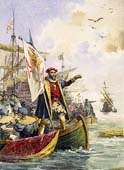Long ruled by Arabs, the ancient land of Bahrain was an important trading center, dating all the way back to Roman times.
The Achaemenian dynasty incorporated Bahrain into the Persian Empire in the 6th century BC, and the islands remained under their ruling until the 3rd century when the Parthians took control.
Then in 899 the Qarmatians, a millenarian Ismaili Muslim sect wanting to form a utopian society, seized AD Bahrain. The Qarmatians prevailed as a powerful force in much of the Middle East and Persian Gulf through the 10th century, and provoked a series of attacks, launching raids along routes crossing Arabia and massacring thousands of pilgrims.
An uprising occurred on the island of Bahrain in 1058, forcing the decline of the Qarmatian's power over the region, and pushing the Uyunids into control. The Uyunids ruled until 1235, then the islands were passed along to the Usfurids, followed by the Jabrids in the mid-15th century.
 Portuguese explorers began making their way up the Persian Gulf in the early 16th century, and invaded Bahrain in 1521, driven towards the wealth created by the island's pearl industry. They remained through force for eighty years before an insurgence developed, and Persian ruler, Shah Abbas I, gained control.
Portuguese explorers began making their way up the Persian Gulf in the early 16th century, and invaded Bahrain in 1521, driven towards the wealth created by the island's pearl industry. They remained through force for eighty years before an insurgence developed, and Persian ruler, Shah Abbas I, gained control. Over the next few centuries, Bahrain fell under the control of a number of rulers, including the Persians,Iranians, and the Omanis (at which point the islands were governed by 12 year old Salim, who was Omani ruler Sayyid Sultan's son).
The Al Khalifa tribe succeeded in rising to power in 1820, and began a treaty relationship with Great Britain. This brought on a new era of prosperity and trade for Bahrain, and the islands were no longer dependent upon pearling.
Most notable was Bahrain's trade with India, as India's cultural influence on the islands grew dramatically.
During the years of 1927 through 1957, Bahrain was subject to a major period of social reform under the ruling of Charles Belgrave. The first modern schools were established, along with the American Mission Hospital, and slavery was abolished.
In 1932, oil was discovered off of Bahrain's coast bringing a rapid change to the country, and pushing them into a closer relationship with the United Kingdom.
Bahrain fought alongside the Allies during World War II, and subsequently became a key target area for Italian air raids on the oil refineries.
Following World War II, a leftist nationalist movement was formed, and called for the end of British interference. Political and social uprisings ensued, as strikes and riots continued through the 1960s.
Bahrain declared their independence on August 15, 1971, and joined the United Nations that same year.
However, it wasn't exactly smooth sailing for the country, as a failed coup attempt materialized in 1981 (following the Islamic revolution in Iran), riots were triggered in 1994 by women's participation in a sporting event, and the mid-1990s saw intermittent violence between the government and the cleric-led opposition.
 King Hamad ibn Isa Al Khalifa became head of state in 1999, releasing all political prisoners and granting women the right to vote.
King Hamad ibn Isa Al Khalifa became head of state in 1999, releasing all political prisoners and granting women the right to vote. Demonstrators took to the streets of Manama, Bahrain on February 14, 2011, calling for more political freedom and an end to discrimination.
Almost daily clashes between protesters and security forces are ongoing. As of March 2014 more than 80 civilians and 13 policemen have been killed.
Most of the modern population is concentrated around Manama, the capital city, and much of that population (about 30%) are non-Bahraini immigrants.
This land (especially Bahrain Island) is primarily barren desert, with a limestone surface. Petroleum processing and refining, as well as international banking are the major industries.
Repressive heat and humidity are commonplace here, especially in summer, and most tourists arrive in the somewhat cooler months, November - February.
No comments:
Post a Comment